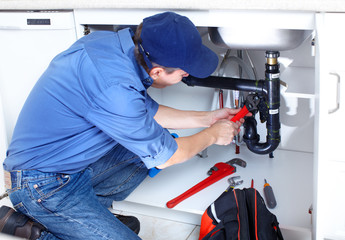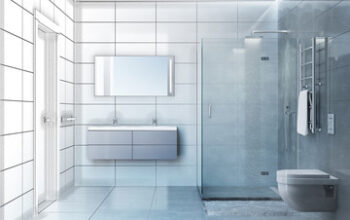 Residential plumbers work on the pipes that bring water into and carry waste away from homes. They must have strong customer service skills and be able to understand complex plumbing systems. Contact Provo UT Plumber for professional expertise.
Residential plumbers work on the pipes that bring water into and carry waste away from homes. They must have strong customer service skills and be able to understand complex plumbing systems. Contact Provo UT Plumber for professional expertise.
Plumbing issues are often difficult to notice, but knowing the warning signs can help homeowners avoid expensive and inconvenient problems. Learn more about this in-demand career.
Residential
Residential plumbers work on plumbing systems in private residences. These include single-family homes, apartment buildings and condos. They can handle basic repairs, such as leaky faucets and clogged drains, as well as more complicated tasks, like installing new fixtures or replacing old pipes. They often have a high school diploma or equivalent and completed an apprenticeship program, which combines paid on-the-job training with classroom instruction. They must pass a background check and be licensed to work as a plumber in their state.
Whether you have a leaky faucet or a toilet that won’t flush, it’s important to call a plumber right away. Left unchecked, these issues can lead to water waste and expensive repair bills. In addition, some problems can cause health and safety issues. For example, a clogged drain can lead to mold and bacteria growth, while a broken toilet could result in flooding and water damage.
A residential plumber can help you solve these problems quickly and efficiently. They can also recommend cost-effective solutions to save you money in the long run. It’s best to choose a residential plumber who offers emergency services and has experience working on different types of plumbing systems.
Plumbers are required to use a variety of tools and materials to complete their work, including PVC, copper and PEX pipes, flanges and fittings, wrenches, screwdrivers, power snakes and hand tools. They must be able to read blueprints and understand plumbing codes. They must also be able to diagnose problems and find the correct solution. They may also be responsible for testing and inspecting backflow prevention devices.
While many people don’t think about their plumbing systems on a regular basis, it’s important to maintain them. Your home’s plumbing system is made up of supply lines that bring in freshwater and drainlines that carry wastewater out. These systems can be affected by a number of factors, such as tree roots, wear and tear, and improper installation. In addition to ensuring your pipes are secure, you should schedule routine maintenance and consider upgrading your plumbing fixtures to improve efficiency.
Commercial
Commercial plumbing is a more specialized field that involves the installation, repair and maintenance of larger water systems. This can include industrial water supply and drainage, as well as systems for large buildings such as hotels and office complexes. Commercial plumbers typically have more experience working with larger, more complicated plumbing systems and may be required to use a variety of specialized tools.
Many of the same skills that are needed for residential plumbing are also necessary for commercial. However, commercial plumbing tends to be more complex due to the size of the buildings and the number of people using them. In addition, commercial plumbing often requires more specialized equipment such as high-powered drain cleaners and sewer cleaning machines.
One of the biggest differences between residential and commercial plumbing is the amount of water used in a day. Commercial properties use far more water than homes, which can put a strain on the system and lead to increased wear and tear. This means that commercial plumbers need to be able to diagnose and fix problems quickly in order to avoid expensive damage.
Another difference is the level of authority that a plumber has when working on a commercial property. When working on a home, the plumber is usually required to get the owner’s permission before making any repairs. However, this is not always the case in a business. This can make it more difficult to find the source of a problem and can delay any repairs that need to be made.
As a result, it is important for commercial plumbers to be able to communicate effectively with their clients and other contractors. They should also be able to read blueprints and understand the layout of the building’s plumbing systems in order to properly assess and repair them. In addition, they should be able to work with a wide range of people including managers and building owners. Finally, they should be able to handle the pressure of working in a fast-paced environment.
Industrial
There are different types of plumbers who specialise in a specific area. For example, industrial plumbers deal with the pipes that supply commercial buildings with water and remove waste water. They also have to comply with stricter regulations than residential plumbers. This makes them better equipped to handle plumbing problems in large properties that are occupied by many people on a regular basis.
Specialized plumbing needs in industrial environments require a wider range of expertise and equipment than residential and commercial systems. For instance, a manufacturing facility may need specialized process piping for chemical handling or corrosive materials, while hospitals need medical gas lines and hygienic waste management systems to meet stringent health and safety requirements.
Similarly, food processing facilities require high-capacity hot water heaters and specialised drainage solutions for food waste. Industrial plumbers have the training and experience to design and install plumbing solutions that address these unique requirements.
In addition to providing a wide range of plumbing services, industrial plumbers also specialise in piping and drainage systems that are used by heavy machinery. These systems often need to be connected to the main pipelines, and they must be able to accommodate high-pressure water systems. In some cases, these systems need to be integrated with other critical industrial equipment.
There are many different types of industrial plumbing systems, and each one has its own set of challenges and requirements. For example, an industrial plumbing system in a factory may need to be connected to multiple other systems, including production machines, heating and cooling systems, and electrical systems. Specialized plumbing solutions are required to ensure that all of these systems operate seamlessly together.
In addition, industrial plumbing systems are typically used on a much larger scale than residential or commercial systems. This means that they are subject to greater wear and tear, and they are more likely to be affected by unforeseen issues such as power outages or water pressure fluctuations. In these situations, it’s important to have a reliable emergency plumber on call who can respond quickly and provide fast repairs to keep business operations running smoothly.
Emergency
When you’re experiencing a plumbing emergency, it’s important to know what to look for and when to call a plumber. Emergency plumbers offer around-the-clock service and can provide immediate assistance for problems that threaten the safety and integrity of your home or business. These issues include severe leaks, flooding, and clogged toilets or drains. Emergency plumbing services will typically charge higher rates than regular plumbers, but the peace of mind gained from knowing that a professional is just a phone call away when disaster strikes is well worth the extra expense.
A burst pipe or major sewage backup are considered emergencies because they can cause extensive water damage in a short amount of time and pose health risks. Other situations that qualify as plumbing emergencies include a loss of water pressure, a broken water heater, and flooded basements. It’s also a good idea to contact emergency plumbers if you suspect a sewer gas leak, as these can be dangerous for your family or pets.
If you’re unsure whether your situation qualifies as an emergency, it’s a good idea to call a plumber for a consultation. They’ll be able to assess the issue and provide advice on how to proceed. In some cases, they may recommend a temporary solution until they can arrive at your home to perform a permanent repair.
In addition to determining what constitutes a plumbing emergency, it’s also important to know when to call a plumber for routine maintenance. A minor leak under the sink, for example, may not require an immediate response, but it should be fixed before the problem worsens. A clogged toilet can also be a plumbing emergency, but it’s not as urgent as losing all access to clean water.
A flooded basement or sump pump is always an emergency, as is any type of water or sewage backup. Other examples of plumbing emergencies include a backed-up septic system, severe water damage due to a clogged sewer line, and a leaking gas line. If you experience any of these issues, it’s a good idea to turn off your water and gas until the plumber arrives.


